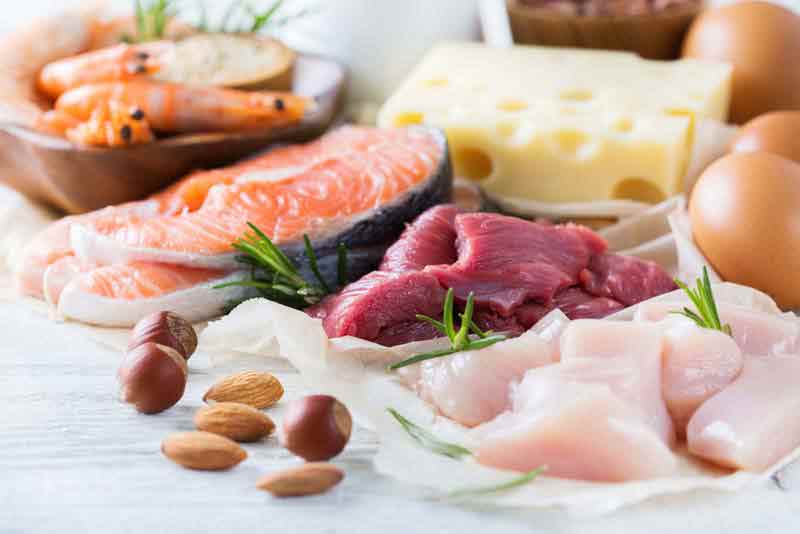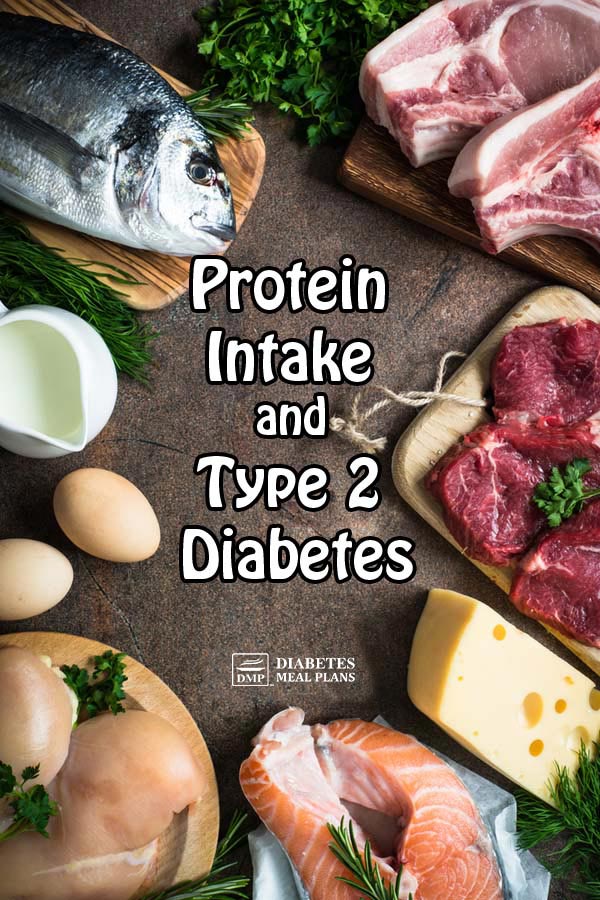Protein is a much needed nutrient that makes up the structure of your entire body. But when it comes to type 2 diabetes, you may be wondering if you need to alter your protein intake.
The short answer is, in most cases, no: just include a good quality protein source at every meal.
The long answer is below…

What is Protein?
Protein is an essential nutrient – meaning, your body requires it from your diet to sustain life.
Protein is a nutrient that is needed in large amounts – a ‘macronutrient’ unlike vitamins and minerals, which are needed in very small amounts (‘micronutrients’). And like other macronutrients – carbohydrates and fat – protein provides calories.
Protein provides the same amount of calories per gram (4) as carbohydrates, but about half as many as fat (9) and alcohol (7) – meaning, there will be fewer calories available for the same weight. Or in other words, 1 gram of protein is equal to 4 calories. These weight/calorie conversions are why a tablespoon of oil (pure fat) is 120 calories, but 2 eggs whites (pure protein) are only about 30 calories. And all foods are measured in this way.
Protein is made up of 20 amino acids (9 essential and 11 non essential), which are kind of like building blocks that form whole proteins. They can be disassembled and reassembled and hold different properties.
For example, if you crack an egg and scramble it up, it has a different appearance and texture because the protein structures have changed. If you put it in a frying pan, the heat will chemically alter the structure in ways that aren’t reversible and again, you have a different product, a more digestible one!
In the same way, once you consume protein, your body can disassemble and reassemble them. For instance, the hormone insulin is made up of 51 different amino acids. But, each individual persons body constructs insulin in a different way.
So the same amino acids used to construct insulin in one person are not the same amino acids the body will use in every single person — that’s the amazingly fascinating thing about our individual DNA — it codes the way our cells/ proteins/ hormones are constructed.
Protein Food Sources
Remember, protein is not a food, it is a nutrient that is found in food.
Common food sources of protein include: meat, chicken, fish, seafood, eggs, cheese, cottage cheese, nuts and seeds, and certain vegetables. For a more detailed list of proteins to include in a low carb diet, click here to view our full food list.
Foods that contain protein but also provide a significant amount of carbs include: beans/lentils, oats, yogurt, milk, and quinoa.
KEY POINT: Majority of foods are “combination” food sources. For instance, all of the foods listed above are combined with fat and fat/carbohydrates. Short of egg whites, skinless chicken breasts, and certain protein powders, you’d be hard pressed to find something that is only protein.
Keep in mind that protein from animal sources is considered “compete” in that they provide all the necessary essential amino acids. Vegetarians and vegans must be intentional about getting a good variety of plant-based protein foods to ensure all essential amino acids are available in their diets.
Protein in the Body
When we think of protein, many of us think of muscle mass. Athletes and body-builders are always trying to find ways to increase protein. While it’s true that muscle is made up of mostly protein and requires sufficient amounts in the diet, it’s also the case that muscles need to be exercised strategically in order to build strength and mass – so please don’t think that by adding protein to your diet, you will automatically begin building muscle.
But even more importantly, protein is the basic building block for all of your tissues – your skin, hair, bones, internal organs; as well as the source for enzymes, which are needed for the thousands of metabolic processes that take place in the body throughout the day.
Protein is also necessary for the formation of hormones and hormonal regulation. Additionally, antibodies are proteins – so when you develop immunity against disease, protein is the basis for fighter cells. Finally, protein is needed for transportation and storage of various molecules within and between cells.
Protein and Blood Sugar
Compared to carbohydrates, protein has a very minor effect on blood sugar. It is not neutral and contrary to what you may have been told, it will not lower blood sugar. No food actually lowers blood sugar directly.
Certainly your overall diet can help control blood glucose levels. But in terms of directly lowering levels, it can only be lowered by proper amounts of insulin in the body and your bodies ability to use insulin efficiently to clear the bloodstream of glucose. And time, activity and medications can help lower blood sugar as well.
However, in comparison with carbohydrates, the effect of protein on blood sugar is very minimal. While it’s possible for the body to convert protein into sugar, it is a very special nutrient the body prefers to use for things like building organs, hormones, immunity, and the like. So again, in and of itself, protein has a minimal effect on blood sugar levels.
When combined with carbohydrates, protein can help slow down the glucose elevation of the carbs. For example, if you eat an apple with a handful of walnuts, compared to eating the apple solo, your blood sugar will rise much more slowly rather than spiking.
Another great thing protein does is provides satiety (a greater feeling of fullness). A little bit goes a long way when it comes to protein whereas it can be very easy to eat a large amount of carbohydrate foods.

Protein in the Diet: How Much?
Protein recommendations will vary considerably from person to person and you may get 10 different answers from professionals weighing in on the proper amounts of protein a person should be consuming.
Like any nutrient you consume, there are downsides to consuming too much as well as not enough protein. Though there is much controversy surrounding the amount of protein one should consume, there is really a pretty narrow range across cultures, age groups, and demographics — overall, most people consume around 15-25% of their calories from protein. But there is evidence to suggest that even an intake making up 35% of your diet causes no harm.
As a general rule of thumb for healthy adults, figure around 1 gram of protein for every kilogram (kg) of body weight. If you are overweight, base this on your ideal weight. This number will put you in the ballpark. Then put a window or range around it.
For example, if I weigh 155 pounds (or if this is my ideal weight for my height), that equates to 70 kg, thus 70 grams protein. So to create a range, I would simply tack on a bit on each end and say 45-85 grams per day.
Another way to do this is to figure out how many calories per day you eat and estimate 20-25% or so to be protein.
Please realize these are general guidelines and a nutrition professional can help individualize your needs.
The thing is, you don’t have to get that specific and count every piece of protein in the way you would carbs. It is a good idea to have some protein at each meal, especially if you are having carbohydrates. Because protein will help to slow down the blood sugar elevation caused by the carbs and provide greater satiety.
Keep in mind that some foods are combinations so you don’t necessarily have to include separate foods. For example, yogurt has protein, fat and carbs. However, fruit is an example of a food that is only carbs, and that in the form of sugar and fructose, so should always be combined with protein such as cottage cheese, nuts, eggs etc.
While protein does provide a lot of benefits, it’s not a wise idea to amp it up as high as possible. When eating a low carb diet, you need to ensure you include plenty of non starchy vegetables as you can’t live on protein alone.
Excessive protein intake can stress the kidneys and there may be some concerns with the excessive intake of other components in protein rich foods, such as red meat or protein powders that can be problematic in large quantities.
Conclusion
In summary, protein is an essential nutrient – meaning, we require it in the diet (along with carbohydrates, fat, vitamins, minerals and water). One is not better or more important than another, what is most important is that we get all of the nutrients we need in the correct quantity.
When it comes to protein, for most people that’s around 20% of their calories or 1 gram protein for every kg body weight, at a healthy weight. Though, protein intake can differ anywhere between 15-35%.
Protein is most nutritious when it comes from natural food sources (as in eggs, fish, meat, cheese, nuts) as opposed to protein powders, shakes and bars, which tend to come with a long list of not-so-healthy ingredients.
Overall you don’t have to be too concerned about measuring protein, unless you have kidney problems, in which case you should follow the instructions of your healthcare team.
But in general the rule is pretty simple: including some protein at each meal is beneficial as it will increase satiety and slow down/ regulate blood sugar elevation from whatever carbohydrates you eat.
Please pin, tweet or share this info to help others. Thanks!

Please send me information to join that includes the bread making videos.
Perhaps you are looking for this link. We offer a Bread Masterclass that includes videos and 30+ recipes for healthier/low carb bread.
Have you ever heard of “Designer Whey” protein powder sold at Trader Joe’s
Natural 100% whey protein ……….
Hi Marie,
Yes, it is a milk-based product. Most of their products are low in sugar without artificial sweeteners.
Hi there, we are halfway through a Quinoa dish. I Googled the stuff and found a near full page of positive Quinoa/diabetes info. Including it’s protein content. Then I read one link that disagreed with all the others. What’ s your take on the little seeds?
We have info on quinoa over here Brewster. It’s not a food that fits into a low carb diet but for someone like yourself who is well controlled, it’s a better choice of grain compared to many. Still high in carbs though so be aware of that.
Well we’ve just tried cauliflower rice for the first time. Green onions, chopped up fried egg, peas and carrots. Soy sauce and some chicken and beef flavouring. Looks and tastes OK
Hi, thank you for the good info. Question ! I was reading about Pea Protein and according to them it is the greatest, are they trying to sell an item or is there some validity to it being a good protein for us…
Thanks don
According to whom? The manufacturing company? Well, you know they will say anything to sell. But the answer when it comes to protein powders is it depends on many factors. We have some info on protein powders over here. The best protein is always going to be protein in it’s full form – chicken, beef, eggs, nuts etc.
Since I have been following Pinterest and the diabetes info that they provide I have made significant progress with reducing my A1c from 6.5 to 5.9. In addition, I have lost 40lbs. In the last year with exercise and proper nutrition that was provided by “diabetic meal plans.” I can’t thank you enough and I con’t. to stay with this program until I am non-diabetic.